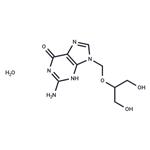
Ganciclovir Ηydrate
- Product NameGanciclovir Ηydrate
- CAS1359968-33-4
- CBNumberCB66034014
- MFC9H15N5O5
- MW273.25
- MOL File1359968-33-4.mol
Chemical Properties
| solubility | DMSO:50.0(Max Conc. mg/mL);195.9(Max Conc. mM) |
Ganciclovir Ηydrate Chemical Properties,Usage,Production
Description
Ganciclovir (INN) is an antiviral medication used to treat or prevent cytomegalovirus (CMV) infections. Ganciclovir is a synthetic analogue of 2′-deoxy-guanosine. It is first phosphorylated to ganciclovir monophosphate by a viral kinase encoded by the cytomegalovirus (CMV) gene UL97 during infection. Subsequently, cellular kinases catalyze the formation of ganciclovir diphosphate and ganciclovir triphosphate, which is present in 10-fold greater concentrations in CMV or herpes simplex virus (HSV)-infected cells than uninfected cells. A prodrug form with improved oral bioavailability (valganciclovir) has also been developed.Uses
Ganciclovir (BW 759) hydrate, a nucleoside analogue, is an orally active antiviral agent with activity against CMV. Ganciclovir hydrate also has activity in vitro against members of the herpes group and some other DNA viruses. Ganciclovir hydrate inhibits the in vitro replication of human herpes viruses (HSV 1 and 2, CMV) and adenovirus serotypes 1, 2, 4, 6, 8, 10, 19, 22 and 28. Ganciclovir hydrate has an IC50 of 5.2 μM for feline herpesvirus type-1 (FHV-1) and can diffuse into the brain[1][2][3].in vitro
A correlation was found between the dose of ganciclovir exposure and a decrease in total cell number when duration exceeded 2 days (r(2)=0.92 and 0.93 after 7 and 14 days, respectively). High levels (20 mg/l) of ganciclovir were not more toxic than lowest levels (1 mg/l) for the shortest durations of ganciclovir exposure (1 and 2 days). Moreover, 50% cytotoxic concentrations markedly decreased with the duration of ganciclovir exposure (374-3 mg/l from 1 to 14 days respectively) after 14 days of culture._x000D_ _x000D_ Reference: Antivir Chem Chemother. 2009;19(6):257-62. https://journals.sagepub.com/doi/10.1177/095632020901900605?url_ver=Z39.88-2003&rfr_id=ori:rid:crossref.org&rfr_dat=cr_pub%20%200pubmedin vivo
Ganciclovir (GCV)-treated CMV-infected mice had lower ABR (P < 0.0001, Kruskal-Wallis test) and DPOAE (P < 0.0001) thresholds compared to CMV-infected untreated mice, indicating that GCV protected mice from CMV-induced hearing loss. Viral load in infected populations undergoing GCV treatment was significantly decreased (P = 0.03) relative to untreated mice. GCV treatment alone had no effect on ABR and DPOAE compared to untreated, uninfected controls (P = 0.1, P = 0.24, respectively). GCV-treated mice received increased protection from OHC loss when compared to untreated groups, with total OHC losses of approximately 7% and 14%, respectively (P < 0.05). Neutropenia was absent after 7 days of GCV treatment._x000D_ _x000D_ Reference: Laryngoscope. 2020 Apr;130(4):1064-1069. https://doi.org/10.1002/lary.28134target
Ganciclovir (RS-21592, BW-759, 2'-Nor-2'-deoxyguanosine) is an antiviral drug for feline herpesvirus type-1 with IC50 of 5.2 μM in a cell-free assay.IC 50
CMV; HSV-1; HSV-2; FHV-1: 5.2 μM (IC50)References
[1] Faulds D, et al. Ganciclovir. A review of its antiviral activity, pharmacokinetic properties and therapeutic efficacy in cytomegalovirus infections. Drugs. 1990;39(4):597-638. DOI:10.2165/00003495-199039040-00008[2] Maggs DJ, et al. In vitro efficacy of ganciclovir, cidofovir, penciclovir, foscarnet, idoxuridine, and acyclovir against feline herpesvirus type-1. Am J Vet Res. 2004 Apr;65(4):399-403. DOI:10.2460/ajvr.2004.65.399
[3] Boujemla I, et al. Pharmacokinetics and tissue diffusion of ganciclovir in mice and rats. Antiviral Res. 2016;132:111-115. DOI:10.1016/j.antiviral.2016.05.019
[4] Fletcher CV, et al. Evaluation of ganciclovir for cytomegalovirus disease. DICP. 1989 Jan;23(1):5-12. DOI:10.1177/106002808902300101
[5] Matthews T, et al. Antiviral activity and mechanism of action of ganciclovir. Rev Infect Dis. 1988 Jul-Aug;10 Suppl 3:S490-4. DOI:10.1093/clinids/10.supplement_3.s490
[6] Duan J, Paris W, Kibler P, Bousquet C, Liuzzi M, Cordingley MG. Dose and duration-dependence of ganciclovir treatment against murine cytomegalovirus infection in severe combined immunodeficient mice. Antiviral Res. 1998;39(3):189-197. DOI:10.1016/s0166-3542(98)00038-2
Preparation Products And Raw materials
Ganciclovir Ηydrate Suppliers
Global(4)Suppliers
| Supplier | Tel | Country | ProdList | Advantage | |
|---|---|---|---|---|---|
| +86-0571-86912261 +8613735419629 |
sales@newcanbio.com | China | 9985 | 58 | |
| +8613564774135 | zijue.cai@tsbiochem.com | United States | 19881 | 58 | |
| 15002134094 | marketing@targetmol.cn | China | 19699 | 58 |
PROMPT×
PROMPT
The What'sApp is temporarily not supported in mainland China
The What'sApp is temporarily not supported in mainland China
Cancel
Determine
